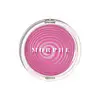What's inside
What's inside
 Key Ingredients
Key Ingredients

 Benefits
Benefits

 Concerns
Concerns

 Ingredients Side-by-side
Ingredients Side-by-side

Ethylhexyl Palmitate
EmollientPentaerythrityl Tetraisostearate
EmollientSynthetic Fluorphlogopite
Polymethylsilsesquioxane
Hydrogenated Microcrystalline Wax
Emulsion StabilisingBis-Diglyceryl Polyacyladipate-2
EmollientHdi/Trimethylol Hexyllactone Crosspolymer
Silica
AbrasiveSynthetic Wax
AbrasiveCeresin
Emulsion StabilisingPhenoxyethanol
PreservativeCocos Nucifera Oil
MaskingCI 77120
Cosmetic ColorantTocopheryl Acetate
AntioxidantHydrolyzed Vegetable Protein
Skin ConditioningHelianthus Annuus Seed Oil
EmollientAluminum Hydroxide
EmollientBambusa Vulgaris Extract
Skin ConditioningRosin
Tin Oxide
AbrasiveTrihydroxystearin
Skin ConditioningSodium Hyaluronate
HumectantGlucomannan
Skin ConditioningCI 77891
Cosmetic ColorantCI 15850
Cosmetic ColorantCI 19140
Cosmetic ColorantCI 42090
Cosmetic ColorantIron Oxides
Ethylhexyl Palmitate, Pentaerythrityl Tetraisostearate, Synthetic Fluorphlogopite, Polymethylsilsesquioxane, Hydrogenated Microcrystalline Wax, Bis-Diglyceryl Polyacyladipate-2, Hdi/Trimethylol Hexyllactone Crosspolymer, Silica, Synthetic Wax, Ceresin, Phenoxyethanol, Cocos Nucifera Oil, CI 77120, Tocopheryl Acetate, Hydrolyzed Vegetable Protein, Helianthus Annuus Seed Oil, Aluminum Hydroxide, Bambusa Vulgaris Extract, Rosin, Tin Oxide, Trihydroxystearin, Sodium Hyaluronate, Glucomannan, CI 77891, CI 15850, CI 19140, CI 42090, Iron Oxides
Talc
AbrasiveMica
Cosmetic ColorantSilica
AbrasiveMagnesium Stearate
Cosmetic ColorantDimethicone
EmollientOctyldodecyl Stearoyl Stearate
EmollientHydrogenated Polyisobutene
EmollientIsononyl Isononanoate
EmollientCaprylic/Capric Triglyceride
MaskingPhenoxyethanol
PreservativeTocopheryl Acetate
AntioxidantCaprylyl Glycol
EmollientEthylhexylglycerin
Skin ConditioningCI 77891
Cosmetic ColorantCI 16035
Cosmetic ColorantCI 77491
Cosmetic ColorantCI 19140
Cosmetic ColorantCI 77007
Cosmetic ColorantCI 15850
Cosmetic ColorantCI 77499
Cosmetic ColorantTalc, Mica, Silica, Magnesium Stearate, Dimethicone, Octyldodecyl Stearoyl Stearate, Hydrogenated Polyisobutene, Isononyl Isononanoate, Caprylic/Capric Triglyceride, Phenoxyethanol, Tocopheryl Acetate, Caprylyl Glycol, Ethylhexylglycerin, CI 77891, CI 16035, CI 77491, CI 19140, CI 77007, CI 15850, CI 77499
Ingredients Explained
These ingredients are found in both products.
Ingredients higher up in an ingredient list are typically present in a larger amount.
Ci 15850 is the pigment color red. It is an azo dye and created synthetically.
Azo dyes need to be thoroughly purified before use. This allows them to be more stable and longer-lasting.
This ingredient is common in foundations, lipsticks, and blushes. This color is described as brown/orangey red.
It has many secondary names such as Red 6 and Red 7. According to a manufacturer, Red 6 usually contains aluminum.
Learn more about CI 15850CI 19140 is also known as Tartrazine. Tartrazine is a synthetic dye used in cosmetics, foods, and medicine to add a yellow color.
Tartrazine is created from petroleum and is water-soluble.
Some people may experience allergies from this dye, especially asthmatics and those with an aspirin intolerance.
Learn more about CI 19140Ci 77891 is a white pigment from Titanium dioxide. It is naturally found in minerals such as rutile and ilmenite.
It's main function is to add a white color to cosmetics. It can also be mixed with other colors to create different shades.
Ci 77891 is commonly found in sunscreens due to its ability to block UV rays.
Learn more about CI 77891Phenoxyethanol is a preservative that has germicide, antimicrobial, and aromatic properties. Studies show that phenoxyethanol can prevent microbial growth. By itself, it has a scent that is similar to that of a rose.
It's often used in formulations along with Caprylyl Glycol to preserve the shelf life of products.
Silica, also known as silicon dioxide, is a naturally occurring mineral. It is used as a fine, spherical, and porous powder in cosmetics.
Though it has exfoliant properties, the function of silica varies depending on the product.
The unique structure of silica enhances the spreadability and adds smoothness, making it a great texture enhancer.
It is also used as an active carrier, emulsifier, and mattifier due to its ability to absorb excess oil.
In some products, tiny microneedles called spicules are made from silica or hydrolyzed sponge. When you rub them in, they lightly polish away dead skin layers and enhance the penetration of active ingredients.
Learn more about SilicaTocopheryl Acetate is AKA Vitamin E. It is an antioxidant and protects your skin from free radicals. Free radicals damage the skin by breaking down collagen.
One study found using Tocopheryl Acetate with Vitamin C decreased the number of sunburned cells.
Tocopheryl Acetate is commonly found in both skincare and dietary supplements.
Learn more about Tocopheryl Acetate